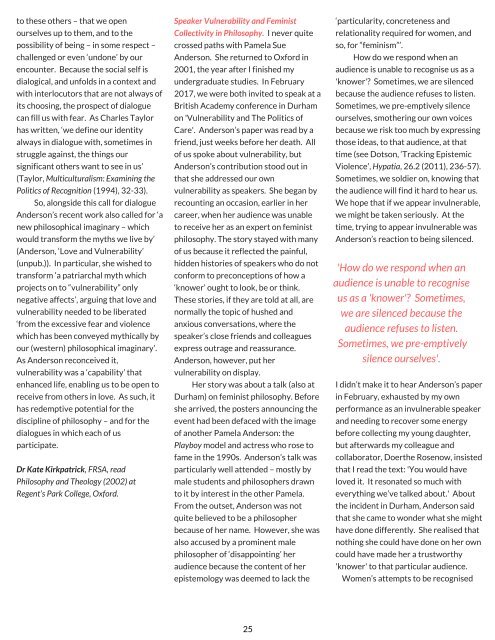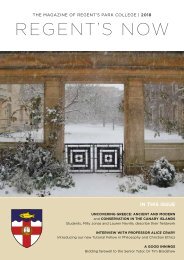RN17
You also want an ePaper? Increase the reach of your titles
YUMPU automatically turns print PDFs into web optimized ePapers that Google loves.
to these others – that we open<br />
ourselves up to them, and to the<br />
possibility of being – in some respect –<br />
challenged or even ‘undone’ by our<br />
encounter. Because the social self is<br />
dialogical, and unfolds in a context and<br />
with interlocutors that are not always of<br />
its choosing, the prospect of dialogue<br />
can fill us with fear. As Charles Taylor<br />
has written, ‘we define our identity<br />
always in dialogue with, sometimes in<br />
struggle against, the things our<br />
significant others want to see in us’<br />
(Taylor, Multiculturalism: Examining the<br />
Politics of Recognition (1994), 32-33).<br />
So, alongside this call for dialogue<br />
Anderson’s recent work also called for ‘a<br />
new philosophical imaginary – which<br />
would transform the myths we live by’<br />
(Anderson, ‘Love and Vulnerability’<br />
(unpub.)). In particular, she wished to<br />
transform ‘a patriarchal myth which<br />
projects on to “vulnerability” only<br />
negative affects’, arguing that love and<br />
vulnerability needed to be liberated<br />
‘from the excessive fear and violence<br />
which has been conveyed mythically by<br />
our (western) philosophical imaginary’.<br />
As Anderson reconceived it,<br />
vulnerability was a ‘capability’ that<br />
enhanced life, enabling us to be open to<br />
receive from others in love. As such, it<br />
has redemptive potential for the<br />
discipline of philosophy – and for the<br />
dialogues in which each of us<br />
participate.<br />
Dr Kate Kirkpatrick, FRSA, read<br />
Philosophy and Theology (2002) at<br />
Regent’s Park College, Oxford.<br />
Speaker Vulnerability and Feminist<br />
Collectivity in Philosophy. I never quite<br />
crossed paths with Pamela Sue<br />
Anderson. She returned to Oxford in<br />
2001, the year after I finished my<br />
undergraduate studies. In February<br />
2017, we were both invited to speak at a<br />
British Academy conference in Durham<br />
on 'Vulnerability and The Politics of<br />
Care'. Anderson’s paper was read by a<br />
friend, just weeks before her death. All<br />
of us spoke about vulnerability, but<br />
Anderson’s contribution stood out in<br />
that she addressed our own<br />
vulnerability as speakers. She began by<br />
recounting an occasion, earlier in her<br />
career, when her audience was unable<br />
to receive her as an expert on feminist<br />
philosophy. The story stayed with many<br />
of us because it reflected the painful,<br />
hidden histories of speakers who do not<br />
conform to preconceptions of how a<br />
‘knower’ ought to look, be or think.<br />
These stories, if they are told at all, are<br />
normally the topic of hushed and<br />
anxious conversations, where the<br />
speaker’s close friends and colleagues<br />
express outrage and reassurance.<br />
Anderson, however, put her<br />
vulnerability on display.<br />
Her story was about a talk (also at<br />
Durham) on feminist philosophy. Before<br />
she arrived, the posters announcing the<br />
event had been defaced with the image<br />
of another Pamela Anderson: the<br />
Playboy model and actress who rose to<br />
fame in the 1990s. Anderson’s talk was<br />
particularly well attended – mostly by<br />
male students and philosophers drawn<br />
to it by interest in the other Pamela.<br />
From the outset, Anderson was not<br />
quite believed to be a philosopher<br />
because of her name. However, she was<br />
also accused by a prominent male<br />
philosopher of ‘disappointing’ her<br />
audience because the content of her<br />
epistemology was deemed to lack the<br />
‘particularity, concreteness and<br />
relationality required for women, and<br />
so, for “feminism”’.<br />
How do we respond when an<br />
audience is unable to recognise us as a<br />
'knower'? Sometimes, we are silenced<br />
because the audience refuses to listen.<br />
Sometimes, we pre-emptively silence<br />
ourselves, smothering our own voices<br />
because we risk too much by expressing<br />
those ideas, to that audience, at that<br />
time (see Dotson, ‘Tracking Epistemic<br />
Violence’, Hypatia, 26.2 (2011), 236-57).<br />
Sometimes, we soldier on, knowing that<br />
the audience will find it hard to hear us.<br />
We hope that if we appear invulnerable,<br />
we might be taken seriously. At the<br />
time, trying to appear invulnerable was<br />
Anderson’s reaction to being silenced.<br />
'How do we respond when an<br />
audience is unable to recognise<br />
us as a 'knower'? Sometimes,<br />
we are silenced because the<br />
audience refuses to listen.<br />
Sometimes, we pre-emptively<br />
silence ourselves'.<br />
I didn’t make it to hear Anderson’s paper<br />
in February, exhausted by my own<br />
performance as an invulnerable speaker<br />
and needing to recover some energy<br />
before collecting my young daughter,<br />
but afterwards my colleague and<br />
collaborator, Doerthe Rosenow, insisted<br />
that I read the text: 'You would have<br />
loved it. It resonated so much with<br />
everything we’ve talked about.' About<br />
the incident in Durham, Anderson said<br />
that she came to wonder what she might<br />
have done differently. She realised that<br />
nothing she could have done on her own<br />
could have made her a trustworthy<br />
'knower' to that particular audience.<br />
Women’s attempts to be recognised<br />
25





